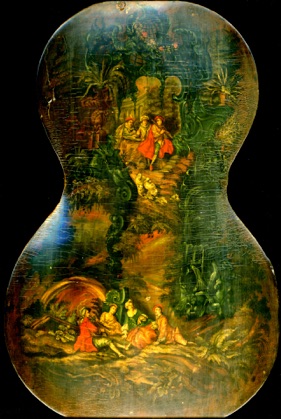Fernando Sor 1778-1839) - menuet
Hans Meijer - French painted guitar


Fernando Sor 1778-1839) - menuet
Hans Meijer - French painted guitar
Fernando Sor was born into a fairly well off and respected family, sometime in February of 1778. The exact date is not known, but it is known that he was baptized on February 14, 1778 in Barcelona, Spain as `José Fernando Macarurio Sors' (Jeffery Sor).
Based on his family's social standing Sor was expected to follow a military career and he did, but he also fell in love with music when his father introduced him to Italian opera. This was to be a great influence on his later musical compositions (Jeffery Composer and Guitarist 13).
Sor's father was also the one to introduce him to the guitar. By the time Sor was eight he was already an accomplished guitarist and musician. His talent was so prevalent at such a young age, it earned him acceptance into the monastery at Montserrat when the new Abbot heard of his musicianship (Jeffery Composer and Guitarist 14).
Sor was sent to study music and courses to further his military career at the monastery of Montserrat. His parents did not expect him to pursue music as career, but to enter the military or attain an administrative post (Jeffery Composer and Guitarist 14-15).
After his father died, when he was about eighteen, his mother could no longer afford to continue his studies at Montserrat and she withdrew him. Sor returned to Barcelona where he received a commission in the `corps de Villa franca' from General Vives (Jeffery Composer and Guitarist 15). This post must have been rather fortunate for Sor since it provided him with the opportunity and the time to write an opera and some early guitar music. Jeffery points out that Sor most likely received his promotion to full lieutenant as a result of his performance on the piano and guitar. This leads to the assumption that the Spanish army fully supported and encouraged music (15). Sometime around the turn of the century, after spending four years at the military school, Sor left and moved to Madrid. Here he found his first patron, the famous Duchess of Alba who was also the patron of the famous Spanish painter Goya. The Duchess was rather different from other aristocrats who supported the arts. Instead of pressuring him to write exclusively for her. She gave Sor a study in her house and let him work on his own pieces at his own speed (Jeffery Composer and Guitarist 18).
In 1808 at the height of Napoleon's reign, the French army invaded Spain. This was the period when Sor began to write more guitar music. Of the pieces that are left from this period, most are nationalistic and written for voice accompanied by guitar, or for solo guitar. These songs were written to provide support for the Spanish army and his fellow countrymen; despite popular belief Sor was a devout Spanish patriot. After the Spanish armies were defeated Sor accepted an administrative post with the new French government. This period of his musical life is very sparse composition wise (Jeffery Composer and Guitarist 43). This might be because Sor did not like that he had to serve under an alien government. Sor was a practical man though, and he did what he had to.
A few years later, the Spanish army finally defeated the French and drove them out. Sor felt compelled to leave his home country, as did many other Spanish artists and aristocrats who had somehow befriended the French. He never returned to Spain again (Jeffery Composer and Guitarist 43).
After leaving Spain in 1813, Sor followed the French back to Paris. This was to be his home for the rest of his life. Paris would also be the city where he composed the major portion of his guitar works, over one hundred are known to exist.

Fernando Sor 1778-1839) - menuet
Hans Meijer - French painted guitar